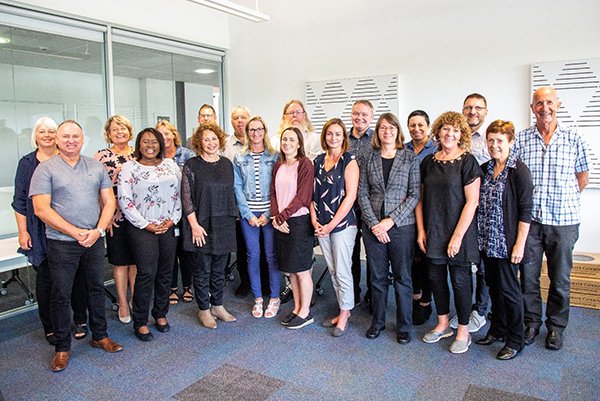Quality improvement facilitators graduate

A second cohort of health professionals has recently graduated from the Health Quality & Safety Commission’s mental health and addiction programme’s quality improvement facilitator (QIF) course.
Beginning in early July 2018, the eight-month course provides frontline staff with quality improvement theory and skills to apply these in a practical sense, thus improving service delivery.
It is delivered by the Commission, Ko Awatea and Counties Manukau Health (CM Health).
Twenty participants graduated – most from district health boards (DHBs), and some from non-government organisations. They include consumer advocates and leaders, nurses, quality safety coordinators, clinical coordinators, mental health and addiction staff, managers and family advisors.
Participants chose an improvement project relevant to their work and which aligns with one of the first two improvement topics launched as part of the programme – zero seclusion or connecting care.
Graduate stories
Wazzy Rivett
Counties Manukau Health (CM Health)
Wazzy Rivett is a nurse specialist at CM Health, a position which gives her overview of clinical quality and an ability to develop projects that focus on change. Wazzy has always been interested in improvement and quality clinical practice.
‘Undertaking and completing the quality improvement facilitator training has been a huge highlight for me. Learning about the necessary principles of improvement has given me more confidence and knowledge to undertake a very important project.”
In line with the mental health and addiction quality improvement programme’s aspirational goal of Zero Seclusion by 2020, CM Health undertook this challenge with the view of creating ‘Safety for All’. Safety for staff, safety for service users and safety for their whānau.
‘I embarked on the quality improvement facilitator training as we were starting the “Safety for All” project. I was able to apply the knowledge and tools from the training to our project.’
The project focused on the centrality of whakawhanaungatanga.
‘We want to build a positive relationship with tangata whaiora right from their arrival at the unit. It is things like asking about their whānau, asking who is at home looking after their children while they are in hospital, who will feed their animals or helping with that urgent utility bill payment.
‘It can be as simple as offering a cup of tea, or a shower. It is about building connections and communicating that we care.’
Wazzy values the shared learning from across the country which meant participants in the QIF training could share ideas and experiences.
‘What made this all so enjoyable was working with Ko Awatea quality advisors who gave guidance and coaching.
‘I’d like to acknowledge the Health Quality & Safety Commission for their research, their information, support and delivery of quality improvement facilitator training. It has given so many an opportunity to look at our systems and how we can improve health care.’
Liam McKenny
Canterbury District Health Board
Liam McKenny is the nurse coordinator within Specialist Mental Health Services, Canterbury District Health Board (CDHB), a role primarily focused on quality improvement. Before completing the quality improvement facilitators’ training Liam says he had reasonable knowledge of quality improvement methods and tools but was not using them to their full potential.
‘The training helped fill in the gaps in my learning,’ Liam says. ‘Some improvement methodologies and tools can be very complex and difficult to apply in a health context. The model for improvement which this training focused on provides a simple yet powerful approach. The model sits well alongside other familiar methodologies like “lean”.’
The connecting care project Liam focused on was about preparing young people for the transition from youth to adult mental health services.
‘Our explorations led us to conclude that a transition is more likely to be successful if preparation starts early. By applying the system of profound knowledge, the training helped us to understand the problem in detail and from various different perspectives.
‘Rather than rushing in with quick, untested solutions, we explored how we could address the problem by deepening our understanding of the system, variation within the system, existing theories and related human factors. That required a lot of talking!
‘Our emerging theory was that it is possible to predict the likelihood that a young person (aged 17+) will transition directly to adult services if certain key indicators are present. Our project worked to identify and test these indicators.
‘We were fortunate to have access to good quality data so we could explore case studies. The data supported our existing theories and helped us formulate new ones. For example, we were confident at the outset that a diagnosis of psychosis, or emotional dysregulation would be significant indicators of transition and the data supported this.
‘However, we also discovered that other indicators such as insight or recurrent admissions to hospital had greater significance than we initially thought. We also learned that indicators we thought would be significant, such as history of trauma, were possibly not as significant as we expected.
‘The testing process was hugely valuable from a philosophical point of view. We were able to approach things slowly and methodically to clarify our understanding and identify next steps.
‘The work represents only a small but significant part of what is set to be a large and complex project. This was just one of many change ideas we identified and hope to explore over the next 12 months. We have also embarked on co-design work to capture the experience of those going through the transition to further inform our improvement efforts.’
Liam says the quality improvement facilitator training has changed his thinking on how to approach and lead quality improvement projects.
‘It is probably the most effective quality focused training I have ever undertaken.’
